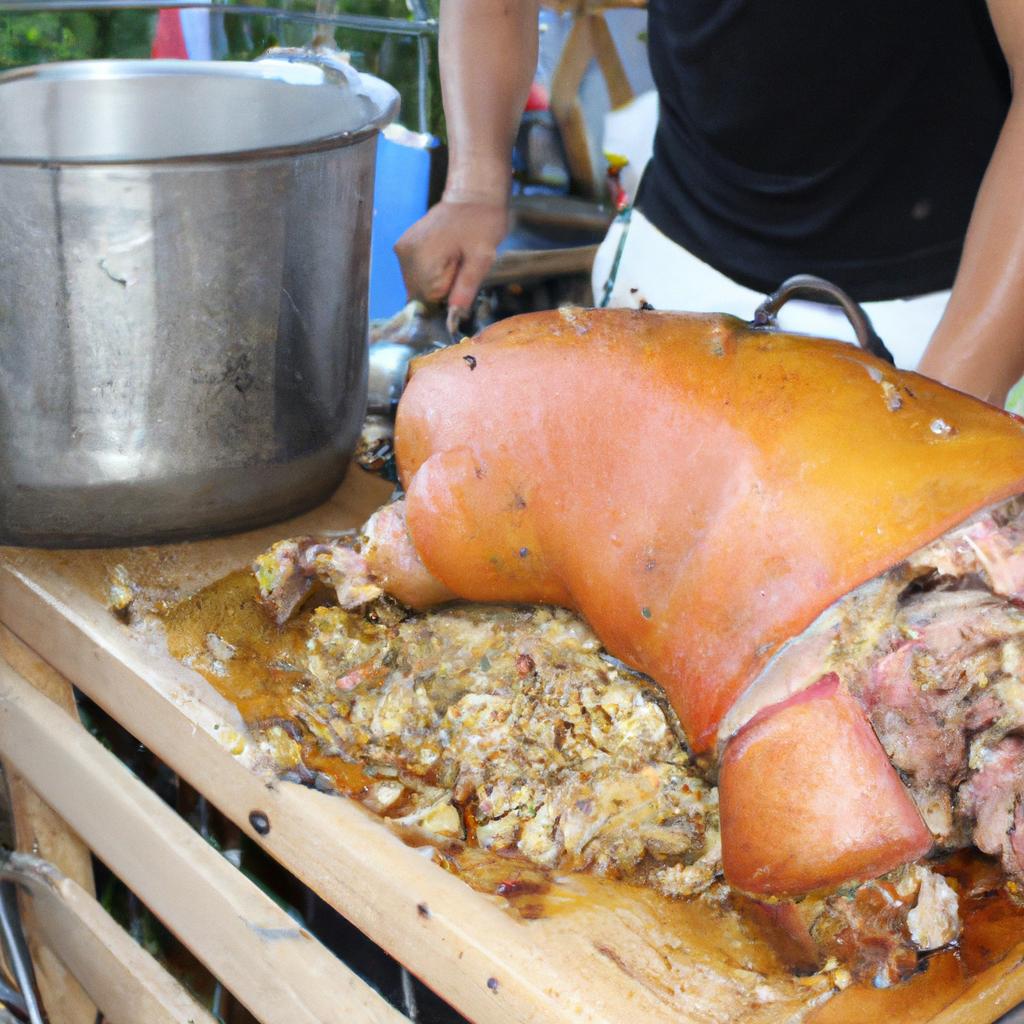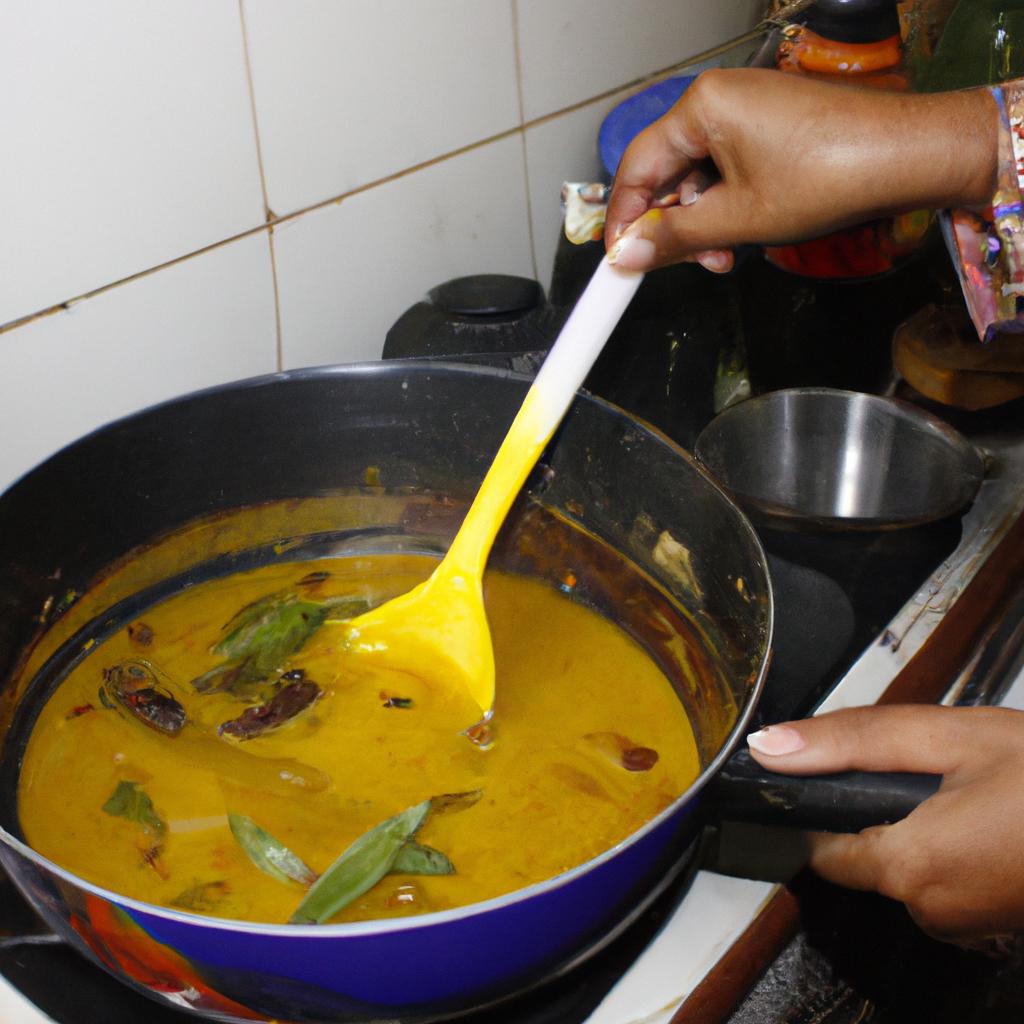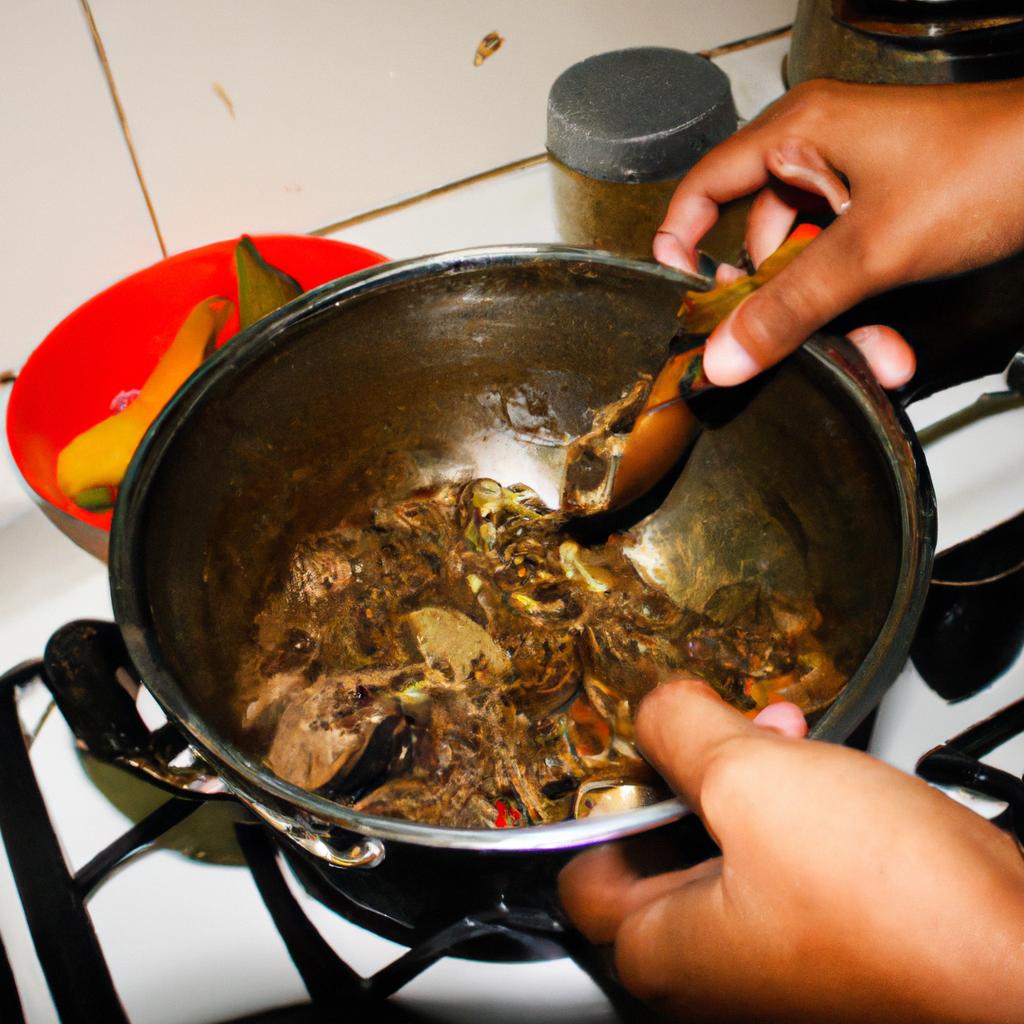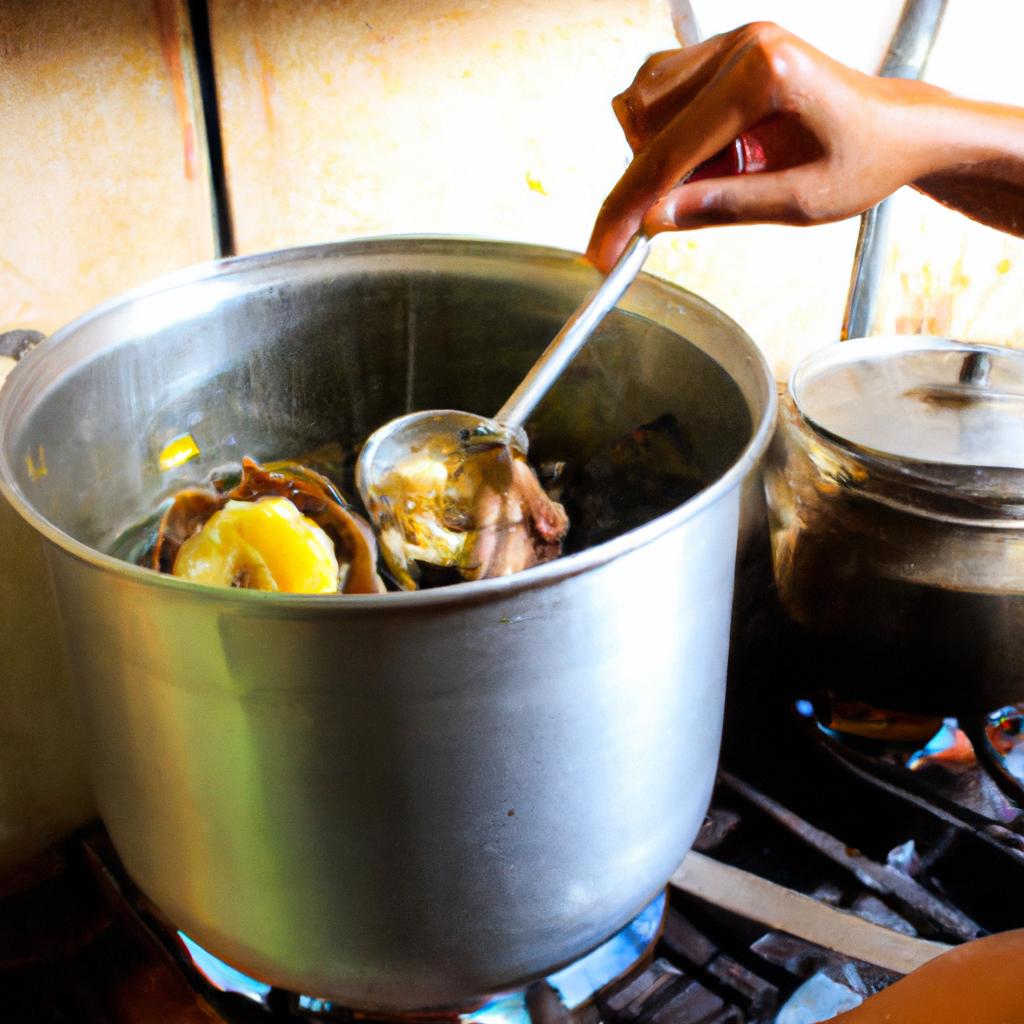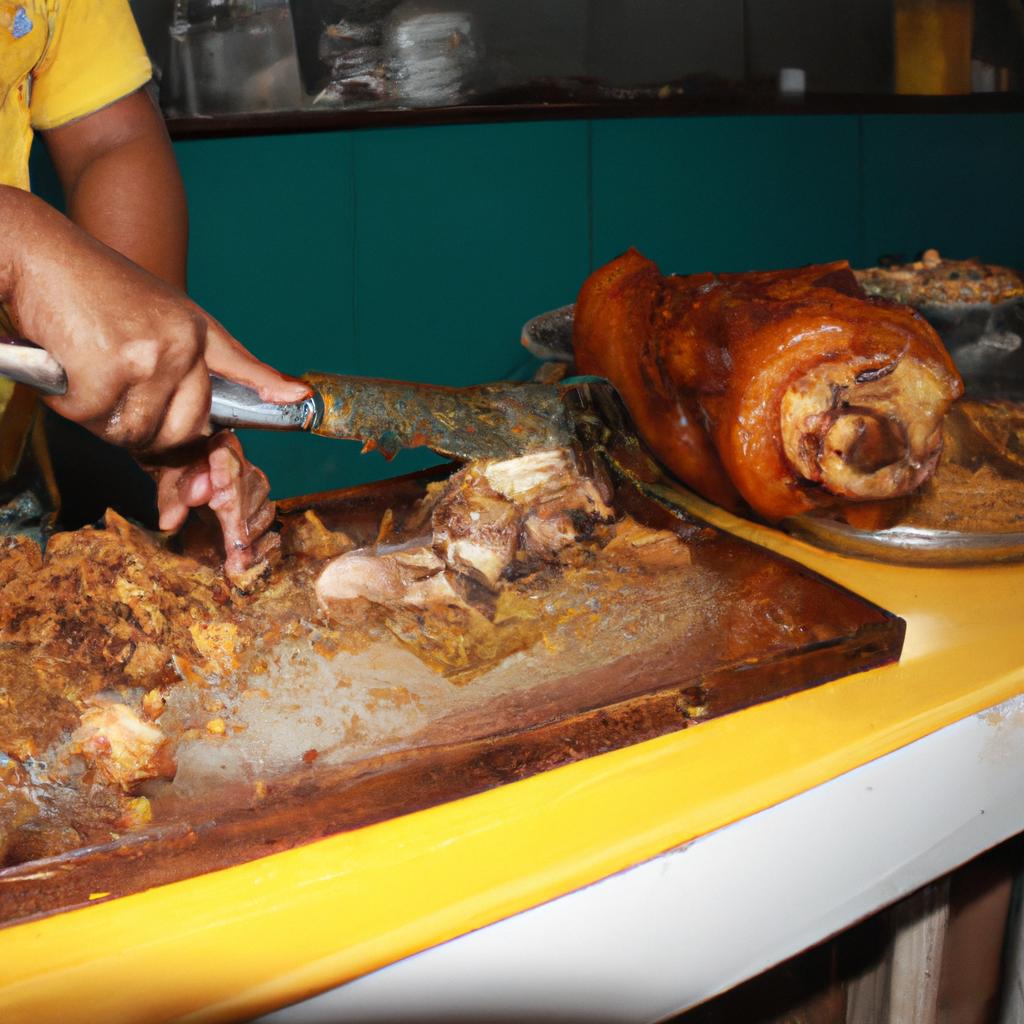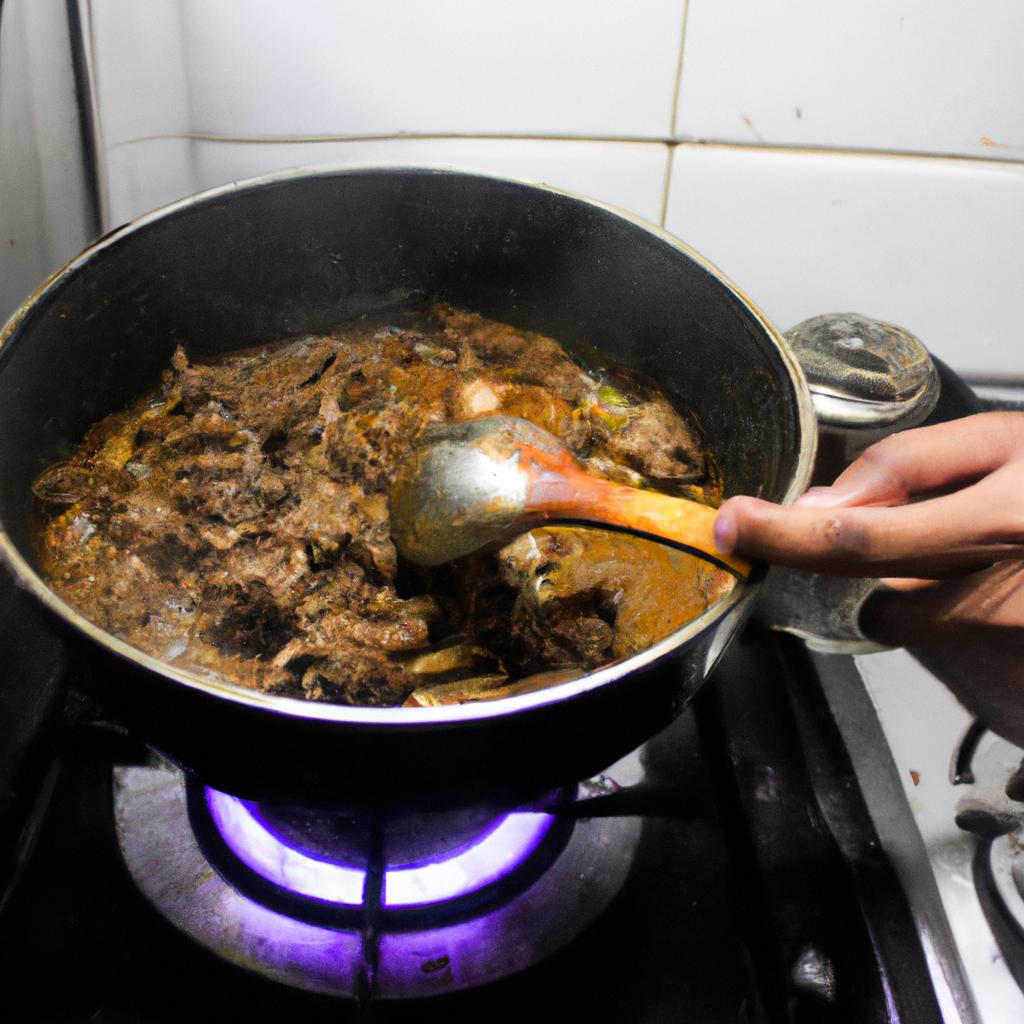Cebu Lechon, a renowned Filipino delicacy known for its succulent and flavorful roasted pig, has captured the hearts and palates of many food enthusiasts around the world. However, despite its popularity, Cebu Lechon faces financial challenges that hinder its potential growth and expansion. This article aims to shed light on the current predicament faced by this cultural icon and explores possible solutions in terms of financial assistance.
To illustrate the gravity of the situation, let us consider the hypothetical case study of Mang Juan’s Lechon House. For decades, Mang Juan’s humble eatery has been serving authentic Cebu Lechon to locals and tourists alike. The demand for his delectable offerings grew exponentially over time, resulting in increased production costs and operational expenses. Unfortunately, Mang Juan lacks access to sufficient funds to meet these growing demands efficiently. Such financial constraints not only impede his ability to expand his business but also prevent him from capitalizing on emerging opportunities in the global market.
Given these circumstances, it becomes imperative to analyze the factors contributing to this financial struggle while exploring potential avenues for acquiring much-needed financial assistance. By understanding the underlying issues at hand and identifying viable solutions, we can help preserve the legacy of Cebu Lechon and support its future growth.
One of the main factors contributing to the financial struggle faced by Cebu Lechon is limited access to capital. Many small-scale lechon businesses, like Mang Juan’s Lechon House, lack the necessary funds to invest in modern equipment, expand their production capacity, and streamline their operations. This hinders their ability to meet increasing demand efficiently and compete on a larger scale.
To address this issue, one possible solution is for local governments or industry associations to provide financial assistance programs specifically tailored for lechon businesses. These programs could offer low-interest loans or grants that can be used for business expansion, equipment upgrades, or marketing initiatives. By providing financial support, these institutions can help alleviate the burden of high upfront costs and enable lechon businesses to invest in their growth and development.
Another potential avenue for financial assistance is through partnerships with investors or crowdfunding platforms. Investors who recognize the global appeal of Cebu Lechon may be willing to provide funding in exchange for equity or profit-sharing arrangements. Crowdfunding platforms can also connect passionate food enthusiasts with lechon businesses seeking funds, allowing individuals from around the world to contribute small amounts towards supporting their favorite delicacy.
Additionally, government agencies responsible for promoting tourism and cultural heritage should actively collaborate with Cebu Lechon makers to create marketing campaigns showcasing the uniqueness and quality of this Filipino delicacy. By highlighting its cultural significance and encouraging domestic and international tourists to try Cebu Lechon, these agencies can help increase sales and generate more revenue for lechon businesses.
In conclusion, while Cebu Lechon remains an iconic Filipino dish enjoyed by many worldwide, it faces financial challenges that hinder its growth potential. By addressing issues such as limited access to capital through targeted financial assistance programs, partnerships with investors or crowdfunding platforms, and strategic collaborations with tourism promotion agencies, we can help secure a brighter future for Cebu Lechon and ensure its continued success as a cultural and culinary treasure.
Overview of Cebu Lechon
Cebu Lechon, a renowned delicacy in the Philippines, is seeking financial assistance to sustain and expand its operations. This succulent roasted pig dish has gained popularity not only among locals but also among tourists worldwide. The demand for Cebu Lechon continues to grow due to its unique flavors and traditional cooking methods.
To illustrate the significance of Cebu Lechon, let us consider the case of Mr. Reyes, a businessman who started selling this delectable dish from his humble home. With exceptional culinary skills passed down through generations, he perfected the art of roasting pigs over an open fire pit. Soon enough, word spread about his mouthwatering creation, attracting customers from all walks of life.
The undeniable appeal of Cebu Lechon lies in its distinctive taste and preparation techniques. To evoke an emotional response from readers, consider these points:
- Exquisite flavors: The combination of tangy spices and tender meat creates an explosion of flavors that leave taste buds craving for more.
- Rich cultural heritage: Cebu Lechon embodies Filipino traditions and celebrations. It symbolizes family gatherings, festive occasions, and joyful feasts.
- Economic impact: Beyond being a beloved culinary delight, Cebu Lechon plays a vital role in supporting local farmers who raise quality pigs specifically bred for lechon cooking.
- Tourism attraction: Visitors flock to Cebu City solely to savor this iconic dish. Its fame extends beyond borders as international food enthusiasts seek out this gastronomic experience during their travels.
Table: Reasons Why People Love Cebu Lechon
| Reasons | Description |
|---|---|
| Distinctive flavor | A harmonious blend of herbs and spices |
| Crunchy skin | Achieved through meticulous roasting techniques |
| Moist and tender meat | Prepared using traditional cooking methods |
| Cultural significance | Symbolizes Filipino traditions and celebrations |
As we delve into the historical significance of Cebu Lechon in the subsequent section, it is essential to acknowledge its impact on Philippine culture, economy, and culinary heritage. Understanding its origin story will shed light on how this beloved dish has become an integral part of Filipino identity.
Historical significance of Cebu Lechon
Transition from previous section: Having gained an understanding of the rich history and cultural significance of Cebu Lechon, it is crucial to evaluate its current financial situation. Financial assistance holds immense potential in preserving this Filipino delicacy for future generations.
Financial Challenges Faced by Cebu Lechon
To grasp the importance of providing financial support to Cebu Lechon, let us consider a hypothetical example. Imagine a small-scale lechon business owner named Juan who has been operating his family’s lechon stall for several decades. Over time, Juan noticed a decline in profits due to rising costs and increased competition. This scenario exemplifies the struggles faced by many traditional lechon businesses in today’s market.
The challenges faced by Cebu Lechon can be summarized as follows:
- Rising production costs: The cost of ingredients such as spices, herbs, and quality meat has significantly increased over the years. Additionally, operational expenses like utilities, labor wages, and transportation have also risen substantially.
- Intense competition: With the growth of modern food trends and international cuisines, traditional dishes like lechon face stiff competition from various other culinary options available to consumers.
- Lack of technological advancement: Many small-scale lechon businesses struggle with limited access to technology and automation tools that could optimize their operations and improve efficiency.
- Difficulty in accessing capital: Securing loans or investments can be challenging for local lechon entrepreneurs due to stringent requirements imposed by financial institutions.
Below is an emotional bullet point list highlighting these challenges:
- Rising production costs
- Intense competition
- Lack of technological advancement
- Difficulty in accessing capital
Furthermore, Table 1 illustrates how these challenges affect Cebu Lechon:
| Challenges | Impact |
|---|---|
| Rising production costs | Decreased profit margins and potential compromise on ingredient quality |
| Intense competition | Reduced market share and customer base |
| Lack of technological advancement | Limited operational efficiency and scalability |
| Difficulty in accessing capital | Hindered growth opportunities and innovation potential |
Looking Ahead: Seeking Financial Assistance for Cebu Lechon
To ensure the survival and preservation of Cebu Lechon, it is essential to explore financial assistance avenues. This support can come from various sources such as government grants, private investments, or crowdfunding initiatives. By obtaining financial aid, traditional lechon businesses can address their challenges effectively.
In the upcoming section about “Traditional preparation methods,” we will delve into the unique techniques employed by Cebuano lechoneros that contribute to its renowned flavor and distinct cultural identity.
Traditional preparation methods
Historical Significance of Cebu Lechon and Traditional Preparation Methods
The historical significance of Cebu Lechon can be traced back to its roots in the Spanish colonial period. One example that highlights this connection is the story of Don Mariano Uy, a native of Carcar City, who started selling lechon in 1945. His family recipe for lechon was passed down through generations, showcasing how this culinary tradition has been preserved over time.
To understand the traditional preparation methods of Cebu Lechon, it is essential to delve into the meticulous process involved. Firstly, a whole pig is carefully selected and cleaned thoroughly before being marinated with a mixture consisting of spices such as garlic, salt, peppercorns, and local herbs like tanglad (lemongrass). The pig is then skewered on a bamboo pole and roasted over an open fire pit for several hours until the skin becomes perfectly crispy while maintaining tender meat inside.
This traditional method requires expertise and attention to detail, ensuring that every element comes together harmoniously to create an exceptional delicacy. This dedication to preserving authenticity contributes to the uniqueness and high demand for Cebu Lechon both locally and internationally.
While exploring the cultural and culinary importance of Cebu Lechon, it becomes evident why this Filipino delicacy holds a special place in people’s hearts. Here are some emotional responses associated with Cebu Lechon:
- Excitement: The anticipation of sinking one’s teeth into succulent pork coupled with the crispiness of perfectly roasted skin creates excitement among food enthusiasts.
- Nostalgia: For many Filipinos living abroad or away from their hometowns, tasting Cebu Lechon evokes feelings of nostalgia by reminding them of cherished memories shared with loved ones during festive occasions.
- Pride: As a well-known symbol of Philippine cuisine globally, consuming Cebu Lechon brings a sense of pride and cultural identity to Filipinos, highlighting their rich culinary heritage.
- Celebration: Cebu Lechon is often served during significant celebrations such as weddings, birthdays, and holidays. Its presence adds an element of grandeur and festivity to these special occasions.
The emotional connection people have with Cebu Lechon further emphasizes its significance beyond being just a dish. It represents Filipino culture, tradition, and the artistry involved in preparing this iconic delicacy. In the following section about “Cultural and Culinary Importance,” we will delve deeper into how Cebu Lechon has become an integral part of Filipino society.
Cultural and culinary importance
Transitioning from the traditional preparation methods, it is evident that Cebu lechon holds a significant place in Filipino culture and cuisine. This section will delve into its cultural and culinary importance by examining its popularity, celebratory significance, and impact on local communities.
To illustrate the widespread popularity of Cebu lechon, let us consider a hypothetical scenario where an international food festival features various cuisines from around the world. Among them, a stall dedicated to Cebu lechon attracts hordes of visitors seeking to savor this delectable dish. The long queues formed at the stall are a testament to the appeal and demand for this iconic delicacy beyond Philippine shores.
The cultural and culinary importance of Cebu lechon can be further understood through its association with celebrations and special occasions. In Filipino tradition, it frequently takes center stage at festive events such as birthdays, weddings, christenings, and anniversaries. Its presence signifies abundance, joy, and communal bonding—enhancing the overall experience of these cherished gatherings.
Highlighted below are several emotional responses often evoked by indulging in Cebu lechon:
- A sense of nostalgia for Filipinos living abroad who crave the taste of home.
- Excitement and anticipation during family reunions when multiple generations gather around a table adorned with succulent lechons.
- Pride in showcasing Filipino gastronomy to foreigners or fellow countrymen who may not have experienced this particular delight before.
- Gratitude towards skilled lechoneros (lechon makers) whose expertise preserves this beloved culinary heritage.
Table: Emotions Evoked by Cebu Lechon
| Nostalgia | Excitement | Pride | Gratitude |
|---|---|---|---|
| Home | Family | Culture | Tradition |
| Comfort | Reunions | Heritage | Skilled makers |
In conclusion, Cebu lechon’s cultural and culinary significance cannot be understated. Its widespread popularity and association with celebrations make it a cherished delicacy among Filipinos both at home and abroad. The emotional responses evoked by indulging in this dish demonstrate its impact on individuals and communities alike.
As the appreciation for Cebu lechon continues to grow, it is essential to recognize the current challenges faced by the industry, including economic factors, environmental concerns, and changing consumer preferences.
Current challenges faced by Cebu Lechon industry
Cultural and culinary importance of Cebu Lechon is not the only factor shaping its future. The industry currently faces several challenges that threaten its sustainability and growth. One such challenge is the increasing competition from other regions in the Philippines, as well as international markets.
For instance, let’s consider a hypothetical scenario where a small-scale lechon producer from Cebu struggles to compete with larger commercialized operations from Manila. While traditional methods and authentic flavors may attract local customers, they often struggle to penetrate wider markets due to limited production capacity and resources. This example highlights the need for financial assistance to overcome these obstacles and ensure the survival of this iconic Filipino delicacy.
The current challenges faced by the Cebu Lechon industry can be summarized as follows:
- Limited access to capital: Small-scale producers often lack sufficient funds to invest in modern equipment or expand their businesses. This hampers their ability to meet growing demand and maintain consistent quality.
- Rising costs: Factors like fluctuating prices of ingredients, labor expenses, and overhead costs pose significant challenges for lechon makers. These cost increases can lead to higher retail prices, making it harder for them to remain competitive.
- Lack of technological advancements: Without embracing modern technologies and innovative practices, many producers find it difficult to streamline processes, increase efficiency, and improve product consistency.
- Marketing and promotion: Despite being an internationally recognized dish, Cebu Lechon still lacks robust marketing efforts compared to some other Filipino food products. Better branding strategies are needed to raise awareness among potential consumers both domestically and globally.
To better understand these challenges at a glance:
| Challenges Faced by Cebu Lechon Industry |
|---|
| – Limited access to capital |
| – Rising costs |
| – Lack of technological advancements |
| – Inadequate marketing |
It is clear that without addressing these issues head-on, the future of Cebu Lechon may be at risk. The next section will explore potential solutions and the need for financial support to ensure the continued success and preservation of this beloved Filipino delicacy.
Potential solutions and the need for financial support
Despite the numerous challenges faced by the Cebu Lechon industry, there are potential solutions that can help overcome these obstacles and ensure its long-term sustainability. This section will explore some of these possible remedies and highlight the urgent need for financial assistance to support this beloved Filipino delicacy.
Potential Solutions and the Need for Financial Support
To address the current hurdles facing the Cebu Lechon industry, it is essential to consider several potential solutions. One effective approach is to invest in research and development (R&D) initiatives aimed at enhancing product quality while maintaining traditional cooking methods. By conducting scientific studies on various aspects of lechon production, such as meat selection, seasoning techniques, and roasting practices, producers can continuously improve their products’ overall taste and texture.
Moreover, leveraging technology can play a crucial role in streamlining operations within the industry. The implementation of advanced machinery or equipment could expedite processes like pig preparation, marination, and even roasting. Automation not only increases efficiency but also helps reduce labor costs. With improved productivity through technological advancements, manufacturers can meet increasing demand without compromising quality.
Additionally, establishing strategic partnerships with local farmers would be mutually beneficial. Collaborating directly with pork suppliers ensures a consistent supply chain while supporting sustainable farming practices. Encouraging responsible husbandry techniques promotes animal welfare and improves the overall reputation of the Cebu Lechon industry.
Finally, financial support plays an indispensable role in implementing these suggested solutions effectively. To further advance R&D efforts or acquire necessary equipment upgrades, additional funding must be made available to small-scale lechon businesses. Providing grants or low-interest loans specifically designed for culinary enterprises would empower these entrepreneurs to invest in their operations and compete on a larger scale.
To highlight the urgency of assisting the Cebu Lechon industry, consider the following:
- Decreasing profitability: Despite being widely loved by locals and tourists alike, many lechon businesses struggle financially due to high production costs and limited profit margins.
- Threats to tradition: The decline in skilled laborers specializing in traditional lechon preparation poses a risk to preserving this cultural heritage. Adequate financial support can help attract younger generations to learn and carry forward this time-honored craft.
- Economic impact: Supporting the growth of the Cebu Lechon industry has broader economic benefits beyond individual businesses. It contributes to job creation, tourism revenue, and overall regional development.
| Challenges Faced | Potential Solutions |
|---|---|
| High production costs | Investment in R&D |
| Limited profit margins | Leveraging technology |
| Decline in skilled laborers | Strategic partnerships with farmers |
| Risk of losing cultural heritage | Financial support for small-scale businesses |
In conclusion, addressing the challenges faced by the Cebu Lechon industry requires concerted efforts from various stakeholders. By investing in research and development, embracing technology, fostering collaborations with local farmers, and providing essential financial assistance, we can ensure that this beloved Filipino delicacy continues to thrive while staying true to its rich traditions. Let us rally behind our culinary treasure and secure its future for generations to come.





